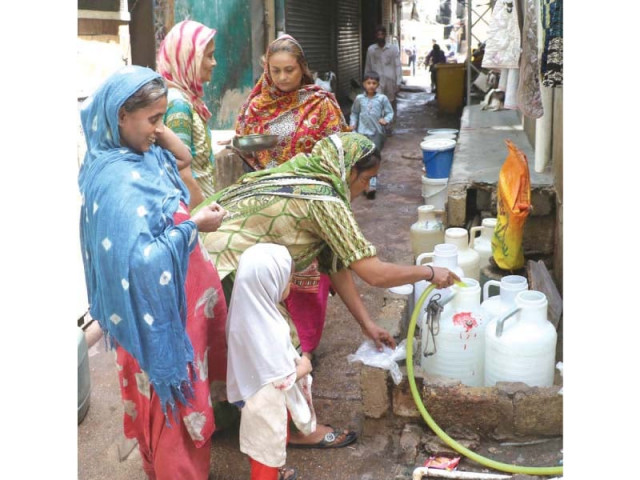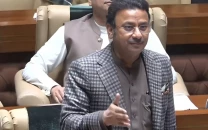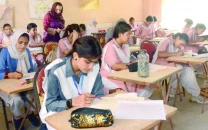Progress report: ‘Over 80% citizens’ complaints resolved’
Judicial commission highlights improvement in water supply, drainage schemes; stresses need to do more

In the third interim report, a target of initiating 92 new water supply and drainage schemes in rural and semi-urban Sindh was set. Against the target, 66 have been completed so far. PHOTO: FILE
The report outlined orders for improvement in the water supply, drainage and sewage treatment services and its implementation.
The commission started working under its head, Justice (retd) Amir Hani Muslim, from January 20, 2018. From January 20 to August 29, a total of 68 hearings and meetings have been conducted. The commission paid 55 visits to the water supply, drainage and other sites in all districts of Sindh from January 21 to August 11.
Supply scheme: RCB seeks NOC for cutting GT Road for water line
During the last two months, the commission has received 170 complaints from the citizens. Of these, 140 stand resolved.
Targets
In the third interim report, a target of initiating 92 new water supply and drainage schemes in rural and semi-urban Sindh was set. Against the target, 66 have been completed so far while the remaining 26 will be finished by September end. The Sindh government's annual development plan (ADP) set a total of 220 new schemes this year under the commission's directives.
A target of rehabilitating 80 water supply and drainage projects in rural and semi urban Sindh was set for early completion among 547 existing schemes. The rehabilitation of 62 schemes has been done while 18 others will be completed by September. These facilities were rendered ineffective due to inappropriate and insufficient maintenance. Another 391 schemes are in the process of tendering while the PC-I is being prepared for the other 276 projects.
The commission had earlier found only 954 water supply and sewage schemes out of around 2,500 functioning in the province. Alum dozing, coagulation and chlorination which are essential components of water filtration were found missing altogether. Therefore, the commission upgraded the existing projects with coagulation and chlorination processes and made inclusion of these components in future projects mandatory.
Sewage treatment
The commission noticed the basic design flaws in the sewage treatment projects. The standard soil compaction of the levees of oxidation ponds was not in practice and the design did not allow the ponds to complete the process of dredging. The lack of dredging led to reduction of the ponds' capacity while also weakening the embankments. Most plants were also seen to be lacking the capacity to store the sewage for a period of seven days to complete oxidation.
The commission traced 550 locations in the province from where untreated municipal and industrial sewage is being released in freshwater bodies, including the Indus River, canals and distributaries. On its orders, the provincial government has approved the PC-I of treatment facilities initially for 10 districts of Sindh. The physical work will commence from the second week of October.
Some 17 water testing laboratories will be established in Sindh by the end of 2018. Contracts have been awarded for four districts so far while the work orders will be issued for the five other districts by mid-September. The public health engineering department will be responsible for the laboratories.
As many as 17 water filtration plants are also being rehabilitated with a completion deadline of June, 2019.
Combined effluent treatment plants
The commission has gotten approved the establishment of five combined effluent treatment plants (CEPT) in Karachi. The Sindh government will pay 67% of the total cost estimated at Rs11.8 billion while the federal government will bear the remaining 33%. The construction will commence from the third week of November, 2018. No CEPT has ever been built in Karachi before.
A sixth CEPT will be built in Nooriabad industrial zone in Jamshoro district. At present, untreated water is being released from the zone in the seasonal canal which ends up in Thatta district's Keenjhar lake, from where water is supplied to Karachi.
The first CEPT was built for Kotri industrial area in Jamshoro district on the Sindh High Court's orders at a cost of almost Rs1 billion. The aim was to end contamination of KB Feeder canal which supplies water to Karachi besides Jamshoro and Thatta districts.
But the plant has failed to produce the desired result. The commission formed two teams, one of which comprised NED university's engineers to assess the plant. After both the teams pointed out design and execution deficiencies, the commission ordered the Sindh government to prepare PC-1 for the rehab which has to be complied by September 15.
Incinerators
On the commission's intervention, 11 existing incinerators in public hospitals of as many districts have so far been repaired and made functional. Eight more being incinerators, which are used to burn hospital waste without contributing to environmental pollution, are being imported from the UK.
The new ones will be delivered for the hospitals in Karachi, Hyderabad, Sukkur, Larkana and Benazirabad by mid-October. Tendering process for seven more incinerators the district headquarter hospitals of as many districts is underway.
Among the five friction heat sterilisation units, two have been installed at government hospital Lyari and Dr Ruth Pfau Civil Hospital in Karachi. The remaining three will be installed by September 15 in Jinnah Postgraduate Medical Center, Karachi, Ghulam Muhammad Mahar Medical College Hospital, Sukkur, and Chandka Medical College Hospital, Larkana.
PHED
The commission took up the task of strengthening the public health engineering department and recruitment of its manpower. Around 211 sub-engineers have been appointed while the Sindh Public Service Commission has been asked to expedite the appointment of BS-17 engineers. The commission in its previous reports held PHED's deficient manpower as one of the reasons for the dysfunctional projects.
SEPA
On the commission's initiative, the provincial government has released Rs98 million for the establishment of 10 district level offices of the agency. The funds for nine more district offices have been earmarked for the ongoing fiscal year. Hitherto, the agency's offices were limited to the divisional headquarters in Sindh.
The environmental regulator's functioning has also activated due to the commission, with the agency filing 152 cases against violators in the environmental tribunal and 384 before the judicial magistrates. A sum of Rs19.5 million in penalties has also been imposed on the violators.
Karachi
Karachi is set to receive 165 MGD additional supply of water by the end of 2019 through two new schemes one of which, 65 MGD plant at Pipri, will become operational by December 2018. The second one, a 100 MGD plant at Dhabeji will begin supply from December 2019.
Some 30 imported chlorination plants for water filtration have been installed. For the areas specially in district West hit by acute shortage of water, 156 Awami Tanks are providing free water to communities.
"Greater Karachi Sewerage Plan S-III is the hallmark of all activities," the report underlined. "It's a comprehensive plan aiming at treatment of sewerage water ... to ensure that not a single drop of untreated sewage is discharged into the sea."
The plant will contribute to the protection of environment besides being a new source of grey water which can be utilised for supply to agriculture and industries. The S-III consists of five components including STP-I, STP-II, STP-III, STP-IV and STP-V with a combined designed treatment capacity of over 520 MGD.
However, the 51 MGD STP-I is working at 45% capacity and 180 MGD STP-III is treating 77 MGD sewage. The rehabilitation of both the plants, which cover Lyari basin, is underway and is set to conclude by December 2019.
The tendering process for STP-II and STP-IV, which will be merged with increased capacity of 180 MGD, is under way. After construction in three years' time, they will treat sewage from Malir basin, Mehmoodabad and some phases of Defence Housing Authority.
On the commission's intervention, the KPT will build a 100 MGD treatment plant at Mai Kolachi road for cantonment and DHA areas besides Pitcher nala, Kalri nala and Nehre-Khayam.
The report stated that the commission has expedited the K-IV project, whose progress stands at 38% presently.
The commission stopped DHA from releasing sewage into the sea especially around the Sea View beach. The DHA has been directed to construct a treatment plant near the Sea View beach, link the Sea View's sewage with phase STP VIII and stop restaurants from polluting the sea.
A massive anti-encroachment drive has been started in 25 nullahs [storm drains] while action on the remaining 13 will start later.
The commission noted that following its orders, the Sindh Solid Waste Management Board has doubled its garbage disposal from 5,268 tons per day in December 2017, to 10,000 tons by August 2018. The SSWMB is operating in four of the six districts of Karachi. The local councils of district Central and Korangi have also agreed to transfer the solid waste collection function to the board.
To maintain attendance of the staff, 80 bio-metric systems have been installed in districts East and South. The board has also established coordination with the Civil Aviation Authority, Karachi Port Trust and the cantonment boards.
"Approximately 39,172 tons offal [of sacrificial animals] was collected and buried in the landfill sites," the report noted.
Under directives of the commission, Karachi Water and Sewerage Board formed regulations for supply of underground water to industries. The board will issue licenses to the suppliers of subsoil water but they will be restricted to use the piped supply and totally avoid the use of water tankers.
Students set out to help water-starved residents
In industrial zones, 366 units have been directed to build in-house treatment plants and 110 units the septic tanks. Moreover, the tender is being floated for the installation of 421 water meters at all the 156 water distribution pumping stations of the KWSB. "Dissemination of real-time information regarding working hours of 156 pumping stations through the website has been put in place by the board but it needs improvement."
Hyderabad
On the commission's orders, three out of five filtration plants including one 30 MGDy and two 8 MGD plants have been rehabilitated while work on the fourth is expected to be completed by December. For the fifth plant in Latifabad, the provincial government will submit it plan to the commission in 20 days.
The city's eastern and southern sewage treatment plants which were funded by the federal government during Gen (Retd) Pervez Musharraf's regime remain incomplete and abandoned. The commission has tasked the planning and development board to examine the schemes and make them functional but no completion deadline has been given.
The tendering process is underway for northern and western sewage treatment plants. The construction is likely to kick off from November 2018.
Published in The Express Tribune, September 2nd, 2018.



















COMMENTS
Comments are moderated and generally will be posted if they are on-topic and not abusive.
For more information, please see our Comments FAQ